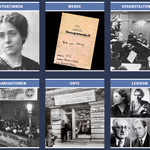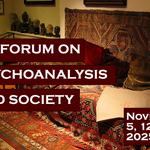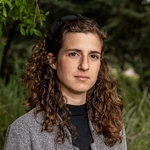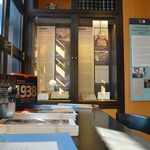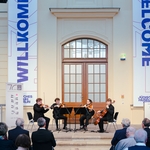Moses Mendelssohn Award for Raphael Gross after Lecture on Anne Frank

- Date
- Fri, Nov 30, 2018
After he delivered the 61st Leo Baeck Memorial Lecture on November 29, 2018, the historian and current president of the German Historical Museum Raphael Gross was surprised to receive LBI’s top honor for scholars—the Moses Mendelssohn Award. In his remarks, LBI President Ronald B. Sobel noted both Gross’s extraordinary scholarship on German-Jewish history and his long service as the Director of the Leo Baeck Institute London. He also pointed out the remarkable fact that his appointment to the German Historical Museum marks the first time that a specialist in Jewish History has led Germany’s premiere public history institution.
Born in Zurich, Gross studied history in Zurich, Berlin, Cambridge, Bielefeld, Jerusalem, and Essen. He received a Ph.D. in history from the University of Essen. From May 2001 to April 2015 he was Director of the Leo Baeck Institute in London and co-editor of the Leo Baeck Institute Year Book. In 2006 he also became director of the Jewish Museum Frankfurt as well as the Fritz Bauer Institute. In 2015 he became a professor in the Department of History at the University of Leipzig and Director of the Simon Dubnow-Institute for Jewish History and Culture in Leipzig. His numerous publications include November 1938. Die Katastrophe vor der Katastrophe (2013) and Carl Schmitt and the Jews. The “Jewish Question”, the Holocaust and German Legal Theory (2007).
The Leo Baeck Memorial Lecture
Otto Frank and Anne Frank's Diary: The History of A Universal Icon
It was during his decade at the helm of the Jewish Museum in Frankfurt, the birthplace of Anne Frank, that Gross became involved in the topic of his lecture. He is currently part of a team of scholars preparing new translations of Anne Frank’s diary and a scholarly monograph that examines the book’s publication and reception. In the lecture, Gross focused on the role that Anne Frank’s father, Otto, played in promoting the diaries as a way of confronting German crimes against the Jews.
Gross pointed out that the term “Holocaust” was not used to describe the murder of European Jewry in the early post-war years, and there was initially little public appetite for holding former Nazis to account or grappling with the participation of wide swaths of German society in their crimes.
In this context, it is remarkable that the diary emerged as what Gross described as a “universal cipher for the recent German mass crimes” in the early years of the Bundesrepublik. Gross argued that the two main factors that allowed the diary to establish itself in West German consciousness were part of the legacy of Otto Frank, who edited the diaries and oversaw their publication.
The first legacy was a material one: Otto provided his children a middle-class upbringing that made the Franks seem not so different from other, non-Jewish Frankfurt families. The widely transmitted images of a “lovely adolescent girl sitting properly at her desk and tending her diary,” asked readers to traverse the smallest distance from their own closely held bourgeois values to arrive at an experience of empathy.
Otto Frank also left his daughter another, posthumous legacy—he scrupulously managed her image in accordance with a humanist vision of individual responsibility for the betterment of self and society. Determined to ensure the widest possible readership for Anne’s story, especially for the education of younger Germans, Otto Frank edited the translation to de-emphasize Anne’s criticism of Germans. Subtle grammatical adjustments—the addition or omission of a direct article here and there—turn passages that could be understood as condemning “Germans” writ-large to limited criticism of bad actors.
By emphasizing the universality of Anne’s suffering, Gross argued that Otto Frank was pursuing not a naive humanism that exculpated Germans, but his ultimate goal—that Anne’s memory should serve a broader purpose.
Latest News
